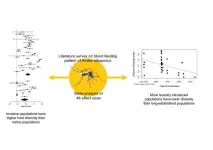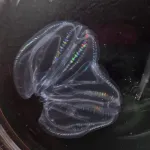(Press-News.org) Weill Cornell Medicine researchers found that the possibility of parental disclosure through online patient portals led older adolescents to hesitate in sharing complete health information with doctors, putting them at risk of missed diagnoses and treatments. The paper noted that confidentiality concerns were increased among females and those who are sexual and gender minorities.
The results, published Oct. 7 in JAMA Pediatrics, are based on a national online survey that targeted 18 to 26 years olds who were eligible to be included on their parents’ insurance plan. Of the 349 participants, 49 percent were on their parents’ insurance.
The research was led by first author Dr. Marianne Sharko, assistant professor of clinical pediatrics and clinical population health sciences at Weill Cornell Medicine and by senior author Dr. Erika Abramson, professor of pediatrics and population health sciences at Weill Cornell Medicine.
Half of the survey respondents said they would hesitate to open an online patient portal if they believed their parents could gain access. If they did open a portal, 55 percent of all respondents said they would change the sensitive information they shared if they thought their parents would see it.
One respondent commented, “I don’t want my parents to know I’m a trans person because that would put me in danger. I should be able to receive care I need without being afraid.” Another said, “I’m in treatment for PTSD from abuse in childhood. My mother would be livid if she found out things I’ve told my therapist…informing her that I have PTSD would tip her off that I ‘blabbed’ about the abuse.”
While patients now have convenient access to their personal health information electronically, as mandated by the 21st Century Cures Act, this availability can lead to fear of sharing sensitive issues that would be documented in their charts. As a result, some patients are at risk for negative consequences such as undiagnosed sexually transmitted infections or untreated mental health disorders.
Although portal confidentiality policies are in place, they vary between institutions and are generally developed by internal working groups, which may not include representation by those with increased confidentiality concerns. To provide safe and equitable care for all patients, health care systems must prioritize confidentiality protection for patient portals, the authors concluded.
This research was funded by the National Institutes of Health grants R01HL161458 and R01NS123639; and the Weill Cornell Medicine Jumpstart Career Development Grant.
END
Protecting confidentiality in adolescent patient portals
2024-10-07
ELSE PRESS RELEASES FROM THIS DATE:
Gatling conducting digitization project
2024-10-07
Benjamin Gatling, Associate Professor, English, College of Humanities and Social Sciences (CHSS), is set to receive funding for a project in which he will digitize a significant portion of the archive of the Folklore Fund at the Rudaki Institute of Language and Literature in Dushanbe, Tajikistan.
Gatling aims to train local archive staff in best practices, the preservation of materials, and digitization and metadata creation for the majority of the archive’s holdings, as well as the curation of digitized materials.
The archive’s holdings include bound notebooks, notecards, ...
Regenstrief researcher awarded $1.9 million CDC grant
2024-10-07
INDIANAPOLIS -- Jill Inderstrodt, PhD, MPH, has received notification of a five-year, $1.9 million collaborative grant to improve health and the care of people living with congenital heart defects (CHD).
Awarded by the Centers for Disease Control and Prevention, Dr, Inderstrodt will lead a multidisciplinary team from the Indiana University Fairbanks School of Public Health and the Regenstrief Institute. Also part of the research team is Brian Dixon, PhD, MPA, a Regenstrief researcher, Fairbanks School professor and interim director of the Regenstrief Center for Biomedical Informatics.
“I am honored to lead this initiative alongside ...
Independent expert report: The Human Brain Project significantly advanced neuroscience
2024-10-07
The European Commission (EC) has released the 10-year assessment of the Human Brain Project (HBP), an EU-Flagship initiative that concluded in 2023. The report was authored by a panel of independent scientific experts. Their assessment of the HBP’s development and results over the full 10 years comes to a strongly positive conclusion. The report highlights that the HBP made major contributions and had a transformative impact on brain research. One of the main outcomes of the HBP is EBRAINS, the open research infrastructure ...
Wu conducting molecular modeling of DR domain of HIV restriction factor PSGL-1
2024-10-07
Yuntao Wu, Professor, Molecular and Microbiology, School of Systems Biology, College of Science, is studying the structure of dicameric repeats (DR) of PSGL-1, a host protein that inhibits HIV virion infectivity.
These are repeated stretches of 10 amino acids with numerous O-glycosylated threonines and prolines.
Wu and his collaborators hypothesize that the structural rigidity and glycosylation of dicameric repeats affect anti-HIV activity.
The researchers have two aims.
First, they aim to determine the structure-function of DR.
Second, they intend to test and validate the anti-HIV activity of PSGL-1 (P-selectin glycoprotein ligand 1) that inactivates ...
Nguyen working to make complex invariants accessible
2024-10-07
Thanhvu Nguyen, Associate Professor, Computer Science, College of Engineering and Computing (CEC), received funding from the National Science Foundation for the project: “Collaborative Research: FMitF: Track II: From Theory to Practice: Making Complex Invariants Accessible with DIG.”
Nguyen and his collaborators are developing the invariant generator DIG-I, which is more efficient and scalable than other invariant generators. It also has applications beyond just invariant discovery. The researchers hold that DIG-I will be ...
Menstrual cycle luteal phase lengths are not 'fixed' at 13-14 days
2024-10-07
The current expectation is that every ovulatory menstrual cycle will have a luteal phase (the time from egg released until the next flow) that lasts approximately 14 days. It is simple, ovulation covers half of the expected, classical 28-day menstrual cycle. That fits with another current concept, “All regular month-apart menstrual cycles are ovulatory.”
“We discovered a wide variety of luteal phase lengths, even in healthy premenopausal women who needed two cycles in a row that were both of normal cycle length and ovulatory in order to join the original study,” said this study’s first author, ...
Should men and women eat different breakfasts to lose weight?
2024-10-07
It’s not a bad thing if you pick a toasted bagel for breakfast, while your partner chooses eggs. In fact, according to a new study from the University of Waterloo, that difference could help you lose some weight.
The study, which employed a mathematical model of men’s and women’s metabolisms, showed that men’s metabolisms respond better on average to a meal laden with high carbohydrates like oats and grains after fasting for several hours, while women are better served ...
SwRI’s Nathan Andrews named AIAA Associate Fellow
2024-10-07
SAN ANTONIO — October 7, 2024 —Southwest Research Institute’s Nathan Andrews has been named an Associate Fellow of the American Institute of Aeronautics and Astronautics (AIAA). AIAA Associate Fellows are recognized for overseeing important engineering or scientific work and outstanding contributions to their field. To receive this honor, nominees must be recommended by at least three other associate fellows, be a senior member in good standing of the AIAA and have at least 12 years of professional experience. AIAA selects only one Associate Fellow for each 150 members each ...
Invasive populations of tiger mosquitoes continuously expand the diversity of hosts in their blood-meal
2024-10-07
The invasive mosquito species, the tiger mosquito (Aedes albopictus), poses significant threats to human and animal health due to its ability to spread over large geographic areas and act as a vector for numerous pathogens. Understanding the ecological relationships this species establishes in different locations is crucial for assessing its worldwide dispersion success and its role in disease transmission. To uncover how invasiveness couples with the ability to adapt to various food sources László Zsolt Garamszegi from the ...
After injury, these comb jellies can fuse to become one
2024-10-07
Researchers reporting in the Cell Press journal Current Biology on October 7 have made the surprising discovery that one species of comb jelly (Mnemiopsis leidyi) can fuse, such that two individuals readily turn into one following an injury. Afterwards, they rapidly synchronize their muscle contractions and merge digestive tracts to share food.
“Our findings suggest that ctenophores may lack a system for allorecognition, which is the ability to distinguish between self and others,” says Kei Jokura (@Ctenophore18) of the University of Exeter, UK, and National Institutes of Natural Sciences in Okazaki, ...



